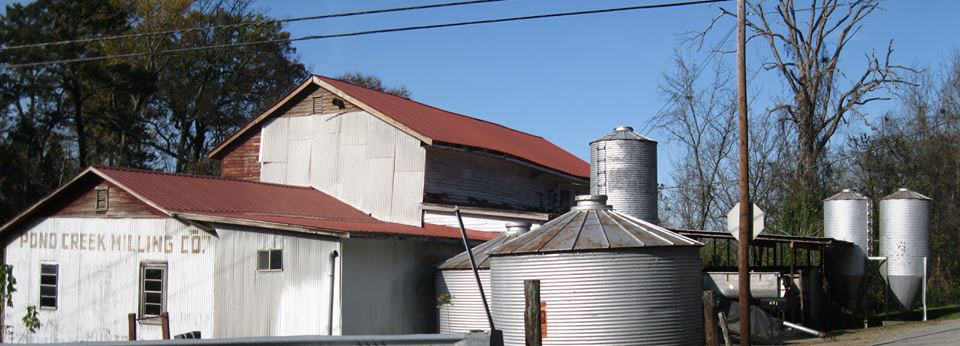
Loudon County Mills
The Lenoir Cotton Mill was a 19th-century cotton mill . One of the earliest examples of industrial architecture in Tennessee, the mill operated variously from its construction around 1830 until the 1950s. The mill was documented by the Historic American Buildings Survey and placed on the National Register of Historic Places in the 1970s. Efforts to restore the mill began in 1980, but before the restoration could be completed, the mill was destroyed.
The Lenoir Cotton Mill was one of several enterprises established by early settler and entrepreneur William Ballard Lenoir (1775–1852). Lenoir moved to the area in 1810 after his father, General William Lenoir, deeded to him the 5,000-acre tract of land comprising what is now Lenoir City.*
The younger Lenoir established the Lenoir Manufacturing Company in 1817, which engaged in multiple agricultural and industrial enterprises throughout the 19th century.[2] The cotton mill was completed in the early 1830s and gradually expanded in subsequent decades. During the U.S. Civil War, Union soldiers destroyed parts of the estate of the Confederate-leaning Lenoir family, but spared the mill due to William Ballard Lenoir's son Benjamin's Mason affiliations. After the Lenoir family sold the mill in the 1890s, it operated variously as a hosiery mill and later as a flour mill.[3]
In 1877 the Lenoir Manufacturing Company was chartered by the Legislature of Tennessee The company owns 3,000 acres of land of which about 1,000 are in cultivation a flouring mill of 150 barrels capacity using the roller process a cotton factory making cotton yarns and batting and a large general store Dr Lenoir is president of the com pany etc (Source:History of Tennessee from the Earliest Time to the Present ..., Volume 4, p. 1085)
Period of Signifigance:1830-1890
United States Department of the Interior
National Park Service
National Register of Historic Places
Continuation Sheet
Section number
7
Page 1
Lenoir Cotton Mill Warehouse
Loudon County, Tennessee
Description
This nomination consists of a single resource, a ca. 1830 one and one-half story timber frame cotton warehouse with brick infill known locally as the Lenoir Cotton Mill Warehouse. Constructed to provide storage space for raw cotton for the newly constructed Lenoir Cotton Mill, it is located at
the southern end of the junction of Bussell’s Ferry Road and Lee Drive opposite the confluence of
the Tennessee and Little Tennessee rivers in Lenoir City (pop. 6,819), Loudon County, Tennessee.
Its unobtrusive appearance belies its early nineteenth timber frame construction and its historical
association with the Lenoir Cotton Mill.
Of the numerous mills, warehouses, and houses that were once part of the vast Lenoir estate, the
warehouse is one of only two extant resources in Lenoir City, Tennessee. The other is the William
Ballard Lenoir family home located approximately one mile north of the warehouse. The Lenoir
house has been extensively altered since it was constructed in 1821 and has been converted to
apartments. A third Lenoir family property, the Lenoir City Cotton Mill, was built about 1830 and
listed on the National Register of Historic Places in 1973. After a ten-year effort to restore and
preserve it, the mill was destroyed by arson in 1991 and was removed from the National Register
(Lenoir City Webworks 2004). A one and one-half story corner of this two and one-half story brick
mill is all that remains standing today as part of a city park. There is one other extant resource
associated with the Lenoir family in the county,the ca. 1857 Albert Lenoir House (NR 4/11/73).
This property is in the City of Loudon.
Robinson's Mills (1825-1849)


